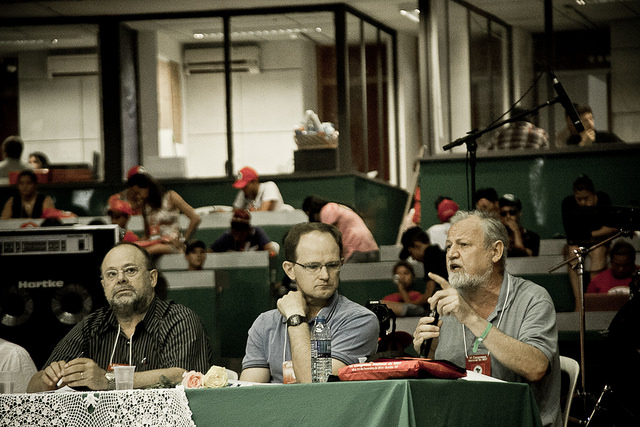 (Brazilia, February 11, 2014) After two years of intense debates, the rural workers arrived at the VI MST National Congress to consolidate a new agrarian program, called People’s Agrarian Reform.
(Brazilia, February 11, 2014) After two years of intense debates, the rural workers arrived at the VI MST National Congress to consolidate a new agrarian program, called People’s Agrarian Reform.
This past Tuesday (11/02), João Pedro Stédile, of the National Coordination of the MST, and Guilherme Delgado, P.h.D in Economics (Unicamp), helped discuss the theme in more depth.
“We did not make a classical Agrarian Reform, and that is not what I am going to talk about” said João Pedro Stédile, referring to the model of agrarian reform that was carried out since the 19th century in some capitalist countries, such as Germany and in the United States. These agrarian reform processes were under the political direction of the industrial bourgeoisie which needed to enlarge the consumer market and to establish supplies of primary materials for industry.
The best example that we have in the recent history of Brazil is the Agrarian Reform proposal put forward by Celso Furtado, who was well acquainted with conditions in the Northeast of Brazil. It was a proposal to expropriate all landholdings of over 500 hectares. It was a revolutionary proposal, and, for this reason, part of the bourgeoisie did not agree to it; in alliance with the imperial powers, they imposed on the country a violent dictatorship that lasted more than 20 years”, said the MST leader.
People’s Agrarian Reform refers to land division and the end of the large land estates (latifundio), and to going beyond the production model and relationship with nature that have been put into place by agribusiness.
At a global level, in the current context of capitalist development in the countryside, the agribusiness model is responsible for the fact that the major use of arable land in Brazil is concentrated on the production of commodities (exportable agricultural goods quoted on the stock exchanges) .
“We cannot take over the land and then emulate the large farming estates, renting the land, exploiting the farm worker”, says Stédile.
The MST believes in the development of production techniques to make the transition towards an agroecological model, which incorporates the peasant workforce and which is able to produce without the use of pesticides.
Other pillars of this new program are: the incorporation of the protection of seeds and of nature in general, with a large reforestation program in settlement areas; the creation of agroindustries under the cooperative control of the workers, ensuring an increased income through the sale of processed products.
According to Stédile, it is necessary to fight for social advances, for example, the right to education in the countryside, the building of social infrastructure, the provision of health care, and other factors that improve the living conditions of rural families.
Challenges to the struggle for land
According to researcher Guilherme Delgado, Ph.D. in Economics from the University of Campinas (Unicamp), throughout history, in certain countries, agrarian reform has been proposed as a response to problems arising from patterns of land ownership and land use. Thus, the democratization of land affects these patterns; with a view to equality, it changes the landholding structure by dividing and distributing land that was previously concentrated in large holdings.
“The agrarian issues that generated the contradictions which led to the creation of the MST and which are expressed in the 1988 Constitution were suppressed during the twenty years of civil-military dictatorship” said Delgado.
According to Delgado, it is thanks to the peasant movement that progressive issues could be put in the Magna Carta. He said, “The Constitution is really an architectural design and a framework, because after that Agrarian Reform can only be made by political struggle”,
“The political process, the political hegemony, which is established in society and the State, will transform that landholding pattern blueprint into reality. What we have had is a negative process that is completely contrary to the landholding pattern established by the Constitution of 88 “, says Delgado, in relation to the continuous loss of legal rights and the ongoing deregulation led by the Congress.
Discussing the struggle for People’s Agrarian Reform, Stédile enumerated the main challenges faced by the MST. Among these challenges are the building of alliances among rural workers, regardless of their form of organization, and the creation of alliances with urban sectors, which form the majority of the population.
“We need to build up our strength in the areas where we have already made conquests, as well as to put into practice these ideas for change. We have to expand our mass struggles, so that the enemy fears our action. For this reason, our strength lies in our capacity for mass struggle”, says Stédile.
“In a more general perspective, we engage, with our struggles, in demands for the democratization of the state, such as the current struggle for changes in political rules. In this way, we continue to build up the strength which will lead to the advent of people-oriented governments that are capable of making the needed changes”, concludes Stédile.
By Rafael Soriano
